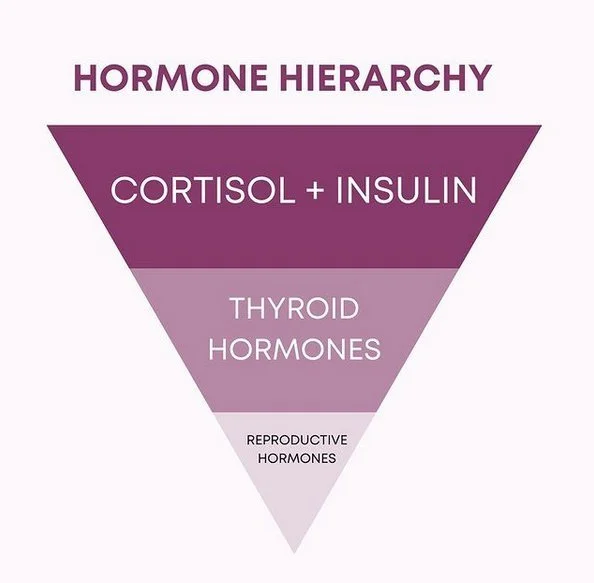The hormonal hierarchy
The hormonal hierarchy is something I speak to EVERY SINGLE client I see. At this point, I feel like a broken record!
In a nutshell, what this means is that we need to address our foundational tier 1 hormones first (cortisol and insulin), before we even attempt to balance our thyroid or reproductive hormones.
Cortisol:
When our stress hormone cortisol is abnormally elevated or elevated long term, this communicates to our body several things:
It sends the message to our brain that we are not safe, and are not in an ideal situation to bring a baby into the world. And even if you are not looking to get pregnant, that is always your bodies’ aim. So if our hypothalamus in the brain senses too much cortisol/stress, this impairs our progesterone production, causing missing or irregular periods. This is known as the ‘pregnenolone steal’.
It tells our brain that there is no food left in the world. This encourages the storage of fat in anticipation of lean times ahead.
Weakens our immune system, leaving us susceptible to recurrent and prolonged infections
It also reduces sensitivity to insulin, steals proteins from our muscles and breaks down muscle tissue, impairs digestion and bodily repair and can result in anxiety, depression and insomnia and lead to dysregulated communication in our hypothalamic adrenal and ovarian axis.
Insulin
Insulin’s main job is to keep blood sugar levels stable, by moving sugar from the bloodstream into your cells where it can be used for energy. Elevated insulin impairs ovulation, and stimulates the ovaries to make testosterone instead of oestrogen, which is a common finding in PCOS. Other factors that contribute to insulin dysregulation include eating too much sugar/refined carbohydrates, genetics, the oral contraceptive pill, stress and caffeine.
So stress raises cortisol levels, cortisol elevates blood sugar (so we can fight off the perceived danger), this elevated blood sugar drives insulin levels higher and voila…. disruptions in tiers 2 and 3 hormones.
So what do we do?
How do we balance our tier 1 hormones? Start with stress reduction strategies and eating to stabilise blood sugars. The latter includes reducing refined sugar intake, ensuring protein is consumed at every meal, eating in a relaxed state, reducing caffeine intake and consuming coffee with or after meals (preferably not on an empty stomach).
Reach out if you need help balancing your hormones!

